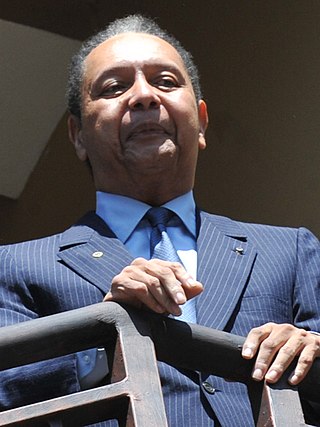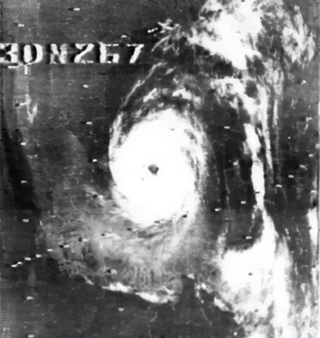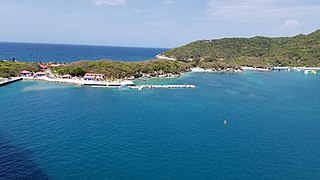
Haiti, officially the Republic of Haiti, is a country on the island of Hispaniola in the Caribbean Sea, east of Cuba and Jamaica, and south of The Bahamas. It occupies the western three-eighths of the island which it shares with the Dominican Republic. Haiti is 27,750 km2 (10,714 sq mi), the third largest country in the Caribbean, and has an estimated population of 11.4 million, making it the most populous Caribbean country. The capital is Port-au-Prince.
The recorded history of Haiti began in 1492, when the European captain and explorer Christopher Columbus landed on a large island in the region of the western Atlantic Ocean that later came to be known as the Caribbean. The western portion of the island of Hispaniola, where Haiti is situated, was inhabited by the Taíno and Arawakan people, who called their island Ayiti. The island was promptly claimed for the Spanish Crown, where it was named La Isla Española, later Latinized to Hispaniola. By the early 17th century, the French had built a settlement on the west of Hispaniola and called it Saint-Domingue. Prior to the Seven Years' War (1756–1763), the economy of Saint-Domingue gradually expanded, with sugar and, later, coffee becoming important export crops. After the war which had disrupted maritime commerce, the colony underwent rapid expansion. In 1767, it exported indigo, cotton and 72 million pounds of raw sugar. By the end of the century, the colony encompassed a third of the entire Atlantic slave trade.
Freeport, a variant of free port, may refer to:

François Duvalier, also known as Papa Doc, was a Haitian politician who served as the president of Haiti from 1957 until his death in 1971. He was elected president in the 1957 general election on a populist and black nationalist platform. After thwarting a military coup d'état in 1958, his regime rapidly became more autocratic and despotic. An undercover government death squad, the Tonton Macoute, indiscriminately tortured or killed Duvalier's opponents; the Tonton Macoute was thought to be so pervasive that Haitians became highly fearful of expressing any form of dissent, even in private. Duvalier further sought to solidify his rule by incorporating elements of Haitian mythology into a personality cult.

Jean-Claude Duvalier, nicknamed "Baby Doc", was a Haitian politician who was the President of Haiti from 1971 until he was overthrown by a popular uprising in February 1986. He succeeded his father François "Papa Doc" Duvalier as the ruler of Haiti after his death in 1971. After assuming power, he introduced cosmetic changes to his father's regime and delegated much authority to his advisors. Thousands of Haitians were killed or tortured, and hundreds of thousands fled the country during his presidency. He maintained a notoriously lavish lifestyle while poverty among his people remained the most widespread of any country in the Western Hemisphere.

The Marine, &c., Broadcasting (Offences) Act 1967, shortened to Marine Broadcasting Offences Act or Marine Offences Act, became law in the United Kingdom at midnight on Monday 14 August 1967. It was subsequently amended by the Wireless Telegraphy Act 2006 and the Broadcasting Act 1990. Its purpose was to extend the powers of the Wireless Telegraphy Act 1949, beyond the territorial land area and territorial waters of the UK to cover airspace and external bodies of water.

Tortuga Island is a Caribbean island that forms part of Haiti, off the northwest coast of Hispaniola. It constitutes the commune of Île de la Tortue in the Port-de-Paix arrondissement of the Nord-Ouest department of Haiti.

Hurricane Inez was a powerful Category 5 major hurricane that affected the Caribbean, Bahamas, Florida, and Mexico, killing over 1,000 people in 1966. It was the first storm on record to affect all of those areas. It originated from a tropical wave over Africa, and became a tropical depression by September 21. It moved slowly westward, initially failing to intensify much; it was upgraded to Tropical Storm Inez on September 24. The storm strengthened into a hurricane and was quickly intensifying when it struck the French overseas region of Guadeloupe on September 27. Inez severely damaged the island's banana and sugar crops, and thousands of homes were damaged, leaving 10,000 people homeless. Damage on Guadeloupe was estimated at $50 million, and there were 40 deaths. After entering the Caribbean, Inez briefly weakened before restrengthening, attaining peak sustained winds of 165 mph (270 km/h) on September 28, eventually making landfall at that intensity in the Dominican Republic. That day a hurricane hunters flight reported a gust of 197 mph (317 km/h), which was the highest recorded at the time.

Radio London, also known as Big L and Wonderful Radio London, was a top 40 offshore commercial station that operated from 23 December 1964 to 14 August 1967, from a ship anchored in the North Sea, three and a half miles (5.6 km) off Frinton-on-Sea, Essex, England.
Pirate radio exists in most countries in Europe.
Swinging Radio England ("SRE") was a top 40 offshore commercial station billed as the "World's Most Powerful" that operated from 3 May 1966 to 13 November 1966 from a ship in the North Sea, four and a half miles off Frinton-on-Sea, Essex, England. While the station was dubbed a pirate radio station, its operation took place within the law and its offices were in the West End of London. Its representation was by a company formed earlier in the year to represent in Europe the ABC radio and television stations of the United States.
Donald Grey Pierson was an American businessman and civic leader in Eastland, Texas. He founded the British pirate stations Wonderful Radio London, Swinging Radio England and Britain Radio during the 1960s. He also attempted to create free ports on the islands of Tortuga, Haiti and Dominica during the 1970s.

Labadee is a private resort located on the northern coast of Haiti within the arrondissement of Cap-Haïtien in the Nord department. In 1985 the government of Haiti under the leadership of the dictator Jean-Claude "Baby Doc" Duvalier leased the area to Royal Caribbean Group, for the exclusive use of passengers of its three cruise lines: Royal Caribbean International, Celebrity Cruises, and Azamara Club Cruises. The lease was later extended to 2050. The resort is completely tourist-oriented and is guarded by a private security force. The site is doubly fenced off from the surrounding area; passengers cannot leave the property and locals cannot enter. Food available to tourists is brought from the cruise ships. A controlled group of Haitian merchants are given sole rights to sell merchandise and establish their businesses in the resort. Although sometimes described as an island in advertisements, it is actually a peninsula contiguous with the island of Hispaniola. The cruise ship moors to the pier at Labadee are capable of servicing the Oasis class ships, which was completed in late 2009. The commercial airport that is closest to Labadee is Cap-Haïtien International Airport.
Tortuga is the Spanish word for a turtle or tortoise. It may also refer to:

Île-à-Vache, is a Caribbean island, one of Haiti's satellite islands. It lies in the Baie de Cayes about 6.5 miles (10.5 km) off the coast of the country's southwest peninsula, roughly between the town of Les Cayes and Pointe l'Abacou. It was formerly known by the name of Abacca. Administratively, it became a commune in 1976 as part of the Les Cayes Arrondissement in the Sud department.
The Party for the Integral Advancement of the Haitian People is a political party in Haiti founded by Colette Jacques in 1990. Jacques was the first woman to have a political party registered and recognized in the country. The PAIPH platform focuses on education, and the party was created to improve Haiti's international image. The PAIPH logo is a green heart on a white canvas, representing a heart of hope for the innocent Haitian.

USS Deal (AG-131/AKL-2) was constructed for the U.S. Army as U.S. Army FS-263 shortly before the end of World War II and later acquired by the U.S. Navy in 1947. She was configured as a transport and cargo ship, classed by the Navy as a Camano-class cargo ship and operated with the U.S. Pacific Fleet from post-World War II and on through the end of the Korean War.
Tourism in Haiti is an industry that generated just under a million arrivals in 2012, and is typically one of the main sources of revenue for the nation. With its favorable climate, second-longest coastline of beaches, and most mountainous ranges in the Caribbean, waterfalls, caves, colonial architecture and distinct cultural history, Haiti has had its history as an attractive destination for tourists. However, unstable governments have long contested its history and the country's economic development throughout the 20th century.

The Armed Forces of Haiti, consisted of the Haitian Army, Haitian Navy, the Haitian Air Force, Haitian Coast Guard, Agence Nationale d'Intelligence (ANI) and some police forces. The Army was always the dominant service with the others serving primarily in a support role. The name of Haiti's military was changed from The Indigenous Army to the Garde d'Haiti after the U.S. invasion and occupation of Haiti in 1915. Then to the Forces Armées d'Haïti—FAd'H in 1958 during the rule of François Duvalier. After years of military interference in politics, including dozens of military coups and attempted coups, Haiti disbanded its military in 1995.

The Duvalier dynasty was an autocratic hereditary dictatorship in Haiti that lasted almost 29 years, from 1957 until 1986, spanning the rule of the father-and-son duo François and Jean-Claude Duvalier.











